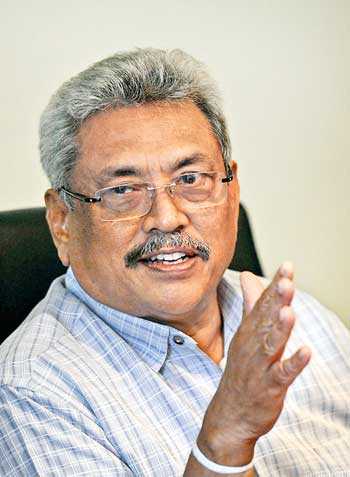Saturday Feb 14, 2026
Saturday Feb 14, 2026
Monday, 9 September 2019 00:00 - - {{hitsCtrl.values.hits}}
With the UNP (at the time of writing) yet to decide on their choice of candidate for the upcoming Presidential elections, former Secretary to the Ministry of Defence Gotabaya Rajapaksa (GR) from the SLPP remains the leading candidate for President.
 |
The current surge in popularity of GR’s candidacy can to some degree be attributed to the people’s disgust at the apathy and sheer negligence by some in the current administration towards national security |
The will of the people should never be taken for granted, and this election may well swing either way – but it is worth considering the potential impact on national security and best course of action for the country if the frontrunner GR manages to win.The tragic events of 21 April have once again brought national security to the forefront as the most pressing issue in this country as Sri Lanka now faces threats from groups few expected to manifest on this small island of ours.
ACLED, the conflict monitoring body, has reported that ISIS has initiated an unprecedented emphasis on its global presence and operationsin 2019, following their loss of territory in Iraq and Syria in 2018.Nearly 60% of Islamic State’s activity in 2019 has taken place outside of West Asia – and has been mainly across South Asia and Africa.
Clearly, national security will be an utmost concern to those casting their votes in the election.
National security policies
The current surge in popularity of GR’s candidacy can to some degree be attributed to the people’s disgust at the apathy and sheer negligence by some in the current administration towards national security. The political dismantling of the security apparatus, coupled with a refusal to address the warnings provided, resulted in one of the most horrific acts of terrorist violence witnessed by this country in recent history.
When the citizens of this country head to the polls, many will cast their votes to the candidate that can win their confidence in remedying the egregious failures and lapses of judgement that led to the horrors of the Easter bombings. GR’s head start in this regard and his (and former President Mahinda Rajapaksa’s) record of eradicating LTTE terrorism will place him in a strong position during the election.
GR has repeatedly emphasised that national security will be his top priority if he is elected.
National security is of course a continuing obligation, and what is more important than election-time platitudes, is the action taken once the next government is in office. The mistakes that led to the Easter attacks must be addressed. This will have to involve difficult, forthright and introspective analysis within the government agencies. The rush to dismantle the security apparatus by the present regime was criticised by many, but few expected the consequences to present themselves so soon.
The overhaul of Sri Lanka’s national security strategy will be a difficult but vital process and must include:

Business confidence
The steep drop in business confidence in Sri Lanka has been drastic. May 2019 saw the lowest level of business confidence in over a decade. There is an intrinsic relationship between a country’s economy and its national security. A stable country promotes investment, attracts foreign expertise, encourages domestic talent to remain, brings in tourists and boosts business confidence. On the other hand, a strong economy allows a country to invest in its people, to raise people out of poverty and to eliminate the harsh living conditions that allowviolent extremism to fester.
When the citizens of this country head to the polls, many will cast their votes to the candidate that can win their confidence in remedying the egregious failures and lapses of judgement that led to the horrors of the Easter bombings. GR’s head start in this regard and his (and former President Mahinda Rajapaksa’s) record of eradicating LTTE terrorism will place him in a strong position during the election
Countries such as Singapore (which Sri Lanka often aspires towards) would never have experienced a fraction of their success without the stability they could offer potential investors. In half a decade, with negligible national resources, Singapore was able to transform their economy far beyond expectations. Whichever side comes into power after the upcoming elections in Sri Lanka, they must ensure consistent economic policies and be able to win the confidence of investors through stability.
International relations
The failure of the present government to react to warnings provided by Indian intelligence clearly demonstrates a breakdown in communication. It also shows the importance of collaboration with international partners to counter extremism.
Undoubtably, many Western countries will not be thrilled at the prospect of a GR presidency. This is the result of a mismanagement of international relations that must not be repeated. Countries such as the US have by far the most experience of dealing with organisations such as ISIS, and Sri Lanka has had far less experience in dealing with this brand of Islamic extremism. However, this does not mean that we have to capitulate to any infringement of national sovereignty.
The first Prime Minister of Singapore Lee Kwan Yew was famous for his integrity – once refusing to yield to the CIA who were discovered conducting illegal operations without governmental consent, who then tried to bribe him with millions of dollars to keep quiet. Instead they were forced to retract and apologise.
China has increasingly become one of Sri Lanka’s most important strategic partners. The UNP government’s ill-advised decision to halt Chinese development projects backfired spectacularly in a clear demonstration of the perils of being too reactionarily political with international business. Both GR and MR are well-known to have better relations with China, and we may see increased investment if GR wins the Presidency. However, many people (both domestically and internationally) are concerned about increased Chinese presence in Sri Lanka. Whether or not these fears have merit, it is less than ideal to rely entirely on one country for development. Our partnerships with many other countries still hold much potential.
India will be closely watching this election, and their fears of Chinese influence in Sri Lanka must be assuaged. If they are diplomatically balanced, India can provide a much-needed boost to Sri Lanka’s economy with investment and trade. Furthermore, as our closest neighbour they will be highly concerned about the advent of fundamentalist extremism in Sri Lanka, and keen to collaborate to ensure security in both countries. Whilst Rajapaksa relations with India had decidedly cooled after the last Presidential elections, it seems that they have taken steps to remedy this – as seen in the concerted diplomatic push seen during MR’s visit to India.
It is clear that national security is a high priority on GR’s agenda, and the current climate places him in a strong position for the Presidential elections. However, there is a long road to establishing security in this country – and we must prioritise a holistic approach to security. We should prioritise addressing past mistakes, eradicating inefficient bureaucracy/corruption and incentivise young educated Sri Lankans with international exposure to return and contribute their skills to the country.
The writer, LLB (Hons), LLM (Public International Law), Barrister-at-Law (England and Wales), is Partner at the WestEndLawCenter and Postgraduate (PhD) Researcher at the University of Durham.